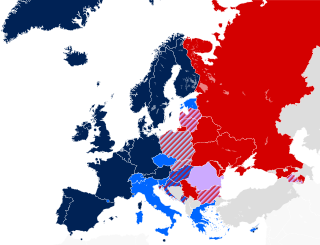Recognition of same-sex unions in Armenia
Same-sex marriage and civil unions are not legal in Armenia. On 3 July 2017, the Ministry of Justice announced that all marriages performed abroad are valid in Armenia, including marriages between people of the same sex, though as of 2020 no same-sex marriages had been recognized.[1][2] The Constitution of Armenia limits marriage to opposite-sex couples.[3][4]
|
Civil unions and registered partnerships |
|
See also
|
|
Notes
* Not yet in effect or automatic deadline set by judicial body for same-sex marriage to become legal |
|
LGBT portal |
History

In 2006, a same-sex couple celebrated an informal wedding ceremony in the country in the Etchmiadzin Cathedral (Holy See of the Armenian Apostolic Church).[5][6] The article published about this improvised marriage in "168 Zham" (168 Hours) newspaper provoked a scandal and indignation of local conservative media outlets, politicians and religious officials.[7]
Civil unions and same-sex marriages are not legal in Armenia and there is little public debate surrounding the issues. The Government has close ties with the Armenian Apostolic Church, which opposes same-sex marriage.
Following amendments in 2015, the Constitution reads:[8][3]
"Article 35. Freedom to Marry
1. A woman and a man having attainted the marriageable age shall have the right to marry and form a family with free expression of their will. The marriageable age and the procedure for marriage and divorce shall be prescribed by law.
2. A woman and a man are entitled to equal rights as to marriage, during marriage and at its dissolution.
3. Freedom to marry may be restricted only by law with the aim of protecting health and morals."
On 18 October 2017, Deputy Tigran Urikhanyan of Prosperous Armenia introduced a bill that would have made changes in the Family Code to further ban same-sex marriages in Armenia.[9] On 15 November 2018, however, the Armenian Government rejected the bill, citing both the Constitution and the Family Code, which already ban it.[10][11][12] Article 10 of the Family Code (Armenian: Ընտանեկան Օրենսգիրք, yntanekan orensgirk) states that "the mutual voluntary consent of a man and a woman and the marital age of them (17 for women and 18 for men) are necessary for marriage conclusion". However, article 11, which lists several outlawed marriages (including bigamy, between close relatives and between adopters and adopted), does not contain prohibitions on marriages between people of the same sex.[13] Parliament rejected the bill in November 2019, labelling it "redundant", while also rejecting a bill which would have explicitly banned adoption by same-sex couples.[14]
Recognition of marriages performed abroad
On 3 July 2017, the Ministry of Justice announced that all marriages performed abroad are valid in Armenia, including marriages between people of the same sex. According to the Family Code, marriages between Armenian citizens, those between Armenian citizens and foreigners or stateless persons, which have been registered outside Armenia, are valid inside the country after consular legalization. The article makes no reference to the sexes of the married partners and stipulates that marriages registered in another country, which are in line with that particular state's legislation, are valid in Armenia.[1][15][2][16] However, no such recognition has yet been documented.[17] It is not known if recognition would give such couples all the rights of marriage under domestic law, also in light of the existing constitutional ban.
In August 2019, the Minister of Justice, Rustam Badasyan, stated that Armenia does not recognize same-sex marriage.[18]
See also
References
- "Same-sex marriages registered abroad are valid in Armenia".
- "Father Vazken Movsesian Joins Equality Armenia Board". Asbarez. November 28, 2017.
- Armenian Constitution of 2015
- Human Rights Situation in Armenia 2015 was a regressive year for LGBT people's rights in Armenia, since the newly accepted Constitution restricted marriage as a union only between a man and a woman
- ""Love and Loyalty": Marriage in secret, in an environment of fear - Features - ArmeniaNow.com". Retrieved 23 August 2015.
- "GAYRUSSIA - Равные права без компромиссов". Retrieved 23 August 2015.
- "GAYRUSSIA - Равные права без компромиссов". Archived from the original on 2 December 2007. Retrieved 23 August 2015.
- "Հայաստանի Հանրապետության Սահմանադրություն". president.am (in Armenian).
- "Tsarukyan faction lawmaker introduces bill on banning same-sex marriages in Armenia". Aysor.am. 18 October 2018.
- "Armenia's legislation already bans same-sex marriages, no additional changes necessary: acting deputy minister". Aysor.am. 15 November 2018.
- "Armenia Cabinet rejects initiative on same-sex marriages". Armenia News. 15 November 2018.
- "Cabinet rejects bill on banning same-sex marriage citing existing prohibition in Constitution". ArmenPress. 15 November 2018.
- "ՀԱՅԱՍՏԱՆԻ ՀԱՆՐԱՊԵՏՈՒԹՅԱՆ ԸՆՏԱՆԵԿԱՆ". arlis.am (in Armenian).
- Khulian, Artak (12 November 2019). "Armenian Parliament Refuses To Hear Bill Banning Same-Sex Marriage". RadioFreeEurope/RadioLiberty.
- Dawn Ennis (December 5, 2017). "Orthodox Christian Cleric Supports Same-Sex Marriage in Armenia". Los Angeles Blade.
- "Armenia Recognizes Same-Sex Marriages Performed Abroad". NewNowNext.com. 4 July 2017.
- Vic Gerami (2019-02-19). "'You have no right to call yourself Armenian' Say Gay Man's Attackers". The Armenian Weekly. Retrieved 2019-03-06.
- https://www.panorama.am/ru/news/2019/08/26/%D0%91%D0%B0%D0%B4%D0%B0%D1%81%D1%8F%D0%BD-%D0%BE%D0%B4%D0%BD%D0%BE%D0%BF%D0%BE%D0%BB%D1%8B%D0%B5-%D0%B1%D1%80%D0%B0%D0%BA%D0%B8/2158112